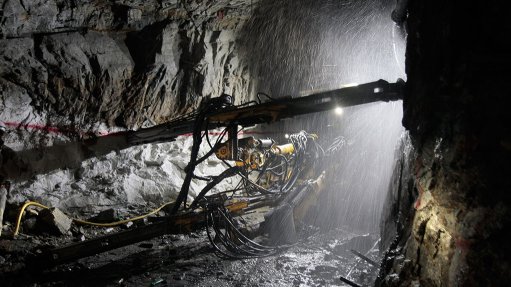
Photo by: Duane Daws
JOHANNESBURG (miningweekly.com) – Despite the implementation of a strategy aimed at buffering gold producer Gold Fields from an enduring low gold price environment, the company said on Thursday that its key South Deep mine had been pushed to “its low point” in 2014.
“South Deep remains challenging and the planned build-up for 2015 will not be achieved. However, we believe that 2014 was the low point for the mine and [we] expect consistent improvement through 2015 and beyond,” CEO Nick Holland said during a presentation of the company’s results for the year ended December 31, in Johannesburg, on Thursday.
Gold production from the operation for the full year was severely impacted by a four-month ground support remediation programme, retreating 34% to 200 500 oz in 2014.
“We were doing reasonably well [at South Deep] in early 2014, but had to make a tough decision to rehabilitate underground. The knock-on effect of this is that we didn’t open stopes for mining for many months, which is why the mine’s 2015 production guidance is lower than expected,” he pointed out.
Gold Fields has narrowed the mine’s production guidance for this year to 228 000 oz and planned to “get back to basics” at South Deep rather than focus on long-term volume objectives.
This would see the group rechanneling investment into skills development by establishing fit-for-purpose training facilities on site.
“We don’t think we’ll need to invest more in terms of people or equipment and we’re unlikely to cut the workforce [any further], but the key now is to get the right skills mix, so that’s our focus for 2015.
“We will position ourselves as a trainer of skills in the mining industry and plan to partner with tertiary institutions to achieve this,” Holland remarked.
The group, meanwhile, reiterated that it had “full confidence” in the South Deep orebody, noting that many of the challenges seen in 2014 were related to the shortage of mechanised mining skills in South Africa, as well as competition with other gold miners for these limited skills.
The mine’s management team had since been replaced by a team with extensive mechanised mining experience, headed by a frank Nico Muller.
“The [previous management] team was very dysfunctional for a lot of reasons and it couldn’t focus on the core strategies because there was a lot of focus and energy on the disappointment related to low ounce production rather than creating a sustainable plan. We had great people but in the wrong position.
“But there’s nothing to suggest that [the mine’s problems] are unrepairable; we just need to be patient as a team,” Muller noted on Thursday.
Key focus areas at the mine for this year would include upgrading the skills of operators and associated maintenance crews in trackless sections, improving fleet management and improving underground working conditions.
Holland, meanwhile, outlined that he did not expect the operation to break even this year, but expected a swing to profitability in the second half of 2016 as increased mining of the open stopes drove greater volumes.
“This year, we want to focus more on being right as opposed to being quick, so we’re focusing on getting the basics right rather than chasing long-term targets that just aren’t achievable,” he commented.
INTERNATIONAL PORTFOLIO
Lifting the group’s overall financial and production showing, Gold Fields’ international assets experienced “a stellar year”, with the Peru-based Cerro Corona mine continuing to be the “jewel in the crown” of Gold Fields’ South American operations.
Equivalent gold output from the mine increased 3% to 326 600 oz at an all-in cost (AIC) of $316/oz, or $702/oz on an equivalent ounce basis.
Operations in Australia also performed strongly, producing 1.03-million ounces over the period, at an AIC of $1 015/oz.
The company planned additional brownfield exploration in Australia in 2015, budgeting some A$80-million.
In West Africa, total production from the region decreased 6% to 736 000 oz, while Damang, in Ghana, improved gold output by 16% to 177 800 oz – largely owing to a recovery plan and higher headgrade. Output from the Tarkwa mine, also in Ghana, narrowed 12% to 558 300 oz as a result of the closure of the heap leach facilities.
CASH GENERATIVE
Holland noted that the group continued to be driven by a strategy aimed at cash generation rather than ounce production.
“Remember that we’ve moved away from [producing] ounces for ounces’ sake and towards cash generation and I think we’ve done that,” he commented, adding that Gold Fields had managed a 16% reduction in net debt to $1.4-billion over the year and had offloaded several noncore assets.
Attributable gold production for the group in 2015 was forecast to be about 2.2-million ounces at an average AIC of $1 055/oz.
The group declared a dividend of R0.20 a share for the six months ended December 31, bringing the year’s total per share payout to R0.40.